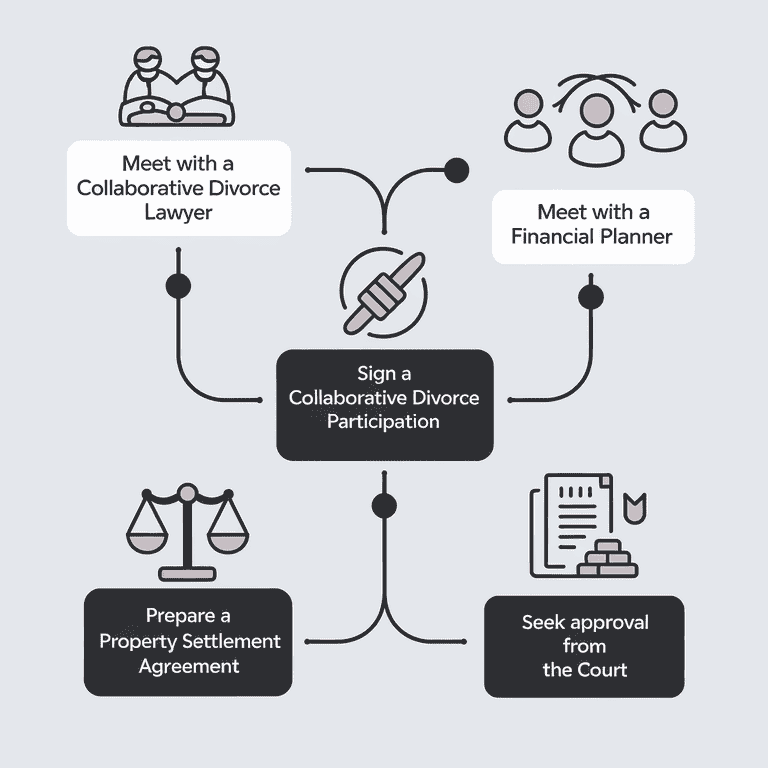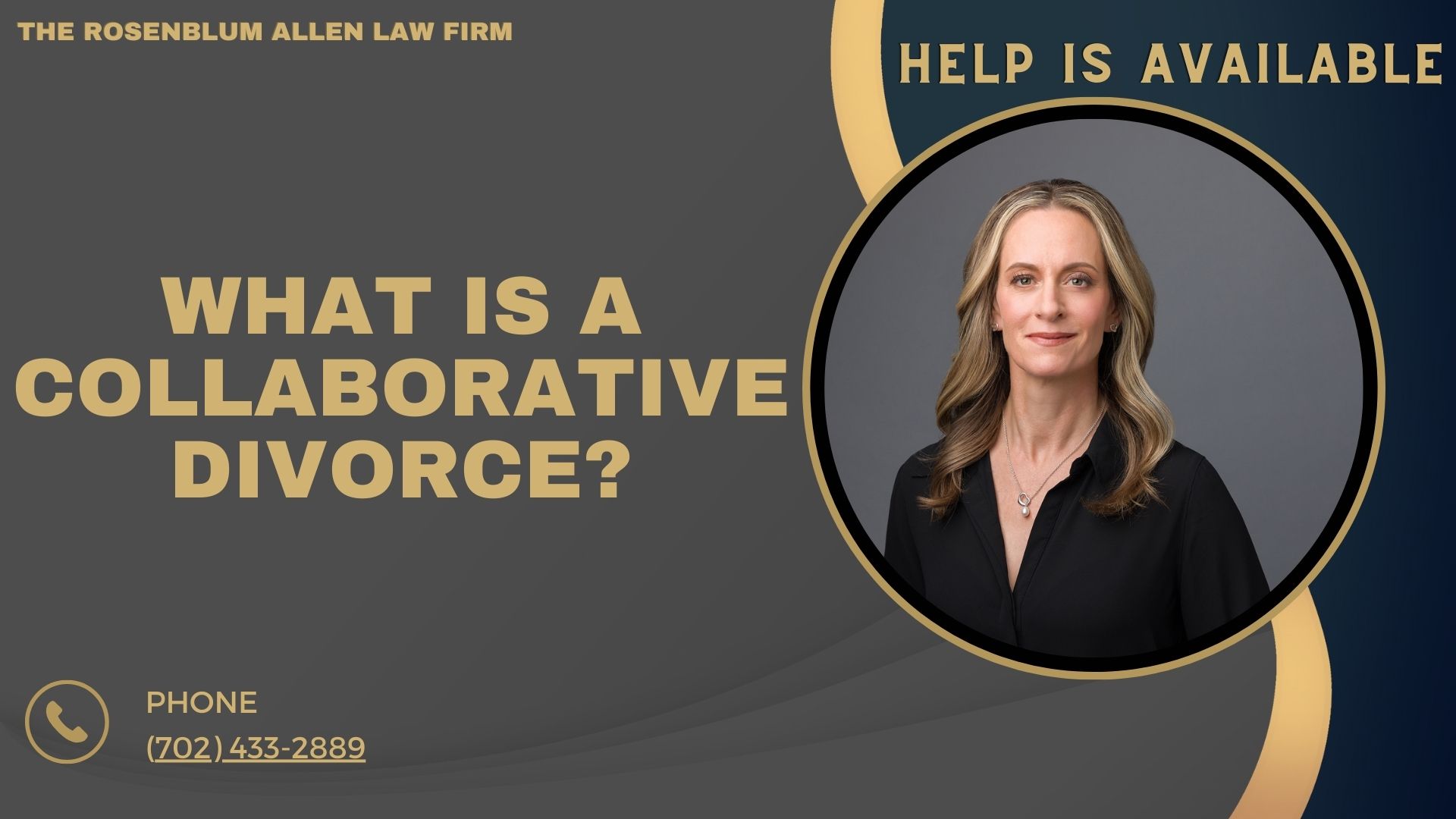A collaborative divorce is a legal process that allows spouses to resolve their divorce outside of court. In this approach, both parties work with their attorneys to negotiate an agreement that addresses all aspects of the divorce, including child custody, division of assets, and financial support. The focus is Collaboration and reaching a mutually beneficial outcome rather than the adversarial nature of traditional divorce litigation.
Key Features of Collaborative Divorce
- Voluntary Participation: Both spouses must agree to enter into the collaborative process. This is not something that can be forced upon either party.
- Commitment to No Litigation: One of the foundational aspects of collaborative divorce is the agreement that neither spouse will resort to court proceedings. If the process breaks down, both attorneys must withdraw, and new representation is needed for any litigation.
- Confidential and Private: Unlike a traditional court case, which is a matter of public record, a collaborative divorce is confidential. Discussions and settlements occur in private meetings.
- Team-Oriented: Collaborative divorce often involves a team of professionals, including financial advisors, child specialists, and mental health professionals, to help guide the process.
Philosophy Behind Collaborative Divorce
Collaborative divorce is grounded in the idea that both parties should work toward a solution that benefits the entire family, especially if children are involved. Focusing on negotiation and compromise aims to minimize the emotional toll that can come with traditional adversarial divorce proceedings. The goal is to reduce conflict, preserve relationships, and enable both spouses to move forward healthily.

How the Collaborative Divorce Process Works
Initial Consultation and Agreement to Collaborate
- Choosing Attorneys: Both spouses select attorneys who are trained in collaborative divorce. These attorneys act not as adversaries but as guides through the negotiation process.
- Signing the Participation Agreement: This document is a formal agreement where both parties pledge to avoid court and commit to the collaborative process. The binding contract states that if the process fails, the current attorneys must withdraw, and litigation will require new legal representation.
- Establishing Ground Rules: Early in the process, ground rules are established, including a commitment to open and honest communication, transparency in financial disclosures, and a respectful approach to negotiations.
Building the Collaborative Team
- Collaborative Attorneys: Each spouse has an attorney, but the attorneys work together to help the couple reach an agreement. They facilitate discussions, provide legal advice, and ensure the final agreement adheres to the law.
- Child Specialists or Therapists: If children are involved, a neutral child specialist may be brought in to ensure that decisions are made with the children’s best interests in mind. Therapists or counselors may also be involved in helping address emotional issues during the process.
Negotiation Sessions
- Series of Joint Meetings: The couple, their attorneys, and any other professionals involved attend a series of meetings to discuss and resolve issues. These meetings are designed to be collaborative rather than confrontational.
- Open Exchange of Information: Both parties must disclose all relevant information, particularly financial details. There is no discovery process like in traditional divorce, where each side investigates the other; instead, transparency is expected from the start.
- Problem-Solving Approach: Rather than focusing on winning or losing, problem-solving is emphasized. The goal is to find solutions that work for both parties, considering their needs and circumstances.
Reaching an Agreement
- Drafting the Settlement Agreement: Once all issues are resolved, the attorneys will draft a settlement agreement outlining the divorce terms. This includes property division, child custody arrangements, and spousal or child support obligations.
- Review and Revision: Both parties will review the agreement with their attorneys. Revisions can be made to ensure both spouses are satisfied with the outcome.
- Finalizing the Divorce: Once the deal is finalized, it is submitted to the court for approval. In most cases, a judge will sign off on the agreement without needing a court appearance, making the process much quicker and less stressful than a traditional divorce.

Benefits of Collaborative Divorce
Control Over the Outcome
- Direct Input in Decision-Making: One of the most significant advantages of collaborative divorce is that the couple retains control over the outcome. Unlike in court, where a judge makes decisions, both parties can craft a settlement that meets their needs.
- Tailored Solutions: Collaborative divorce allows for creative solutions that might not be available through the court. For example, couples can structure financial arrangements in a way that works best for them, even if those solutions don’t follow standard legal formulas.
Preservation of Relationships
- Cooperative Approach: The collaborative process encourages cooperation, which can be particularly important when children are involved. By minimizing conflict, it helps preserve the co-parenting relationship.
- Reduced Emotional Stress: Traditional divorce can be emotionally draining and adversarial. Collaborative divorce reduces that stress by focusing on negotiation rather than confrontation, helping both parties feel more in control of their future.
Privacy and Confidentiality
- Private Discussions: All negotiations occur in private meetings, away from the public eye. This is a significant benefit for couples who prefer to keep their matters confidential.
- Protection of Sensitive Information: Financial and personal information disclosed during the process remains private, unlike litigation, where such details can become part of the public record.
Faster and Less Expensive
- Efficiency: Collaborative divorce can be faster than a traditional divorce because it avoids lengthy court procedures. Without the need for litigation, many divorces can be settled in a matter of months.
- Cost-Effective: Since the process is streamlined and avoids the expenses of court hearings and prolonged legal battles, it often costs less than a traditional divorce.
Potential Drawbacks of Collaborative Divorce
Not Suitable for Every Situation
- High-Conflict Cases: Collaborative divorce requires both spouses to be willing to work together. In cases where there is a high level of conflict or where one spouse is uncooperative, the process may not be effective.
- Power Imbalances: If one spouse has significantly more power or control, collaborative divorce may not provide a fair outcome. In such cases, traditional litigation may be more appropriate.
Risk of Starting Over
- If Collaboration Fails: If the collaborative process breaks down and no agreement can be reached, both parties must start over with new attorneys. This can result in additional legal fees and delay the divorce resolution.

Is Collaborative Divorce Right for You?
Factors to Consider
- Willingness to Cooperate: Collaborative divorce requires both spouses to be committed to working together to resolve issues. The process may fail if either party is unwilling to negotiate in good faith.
- Desire to Avoid Court: If avoiding the stress, expense, and publicity of court proceedings is a priority, collaborative divorce is an excellent option.
- Children’s Well-Being: Couples with children often find that the collaborative process helps protect their kids from the emotional fallout of a contentious divorce, as it emphasizes cooperation and co-parenting.
When Collaborative Divorce May Not Be Ideal
- Domestic Violence or Abuse: Collaborative divorce may not be appropriate in cases where there has been domestic violence or abuse, as the safety and well-being of one spouse could be compromised.
- Hidden Assets or Deception: If there is a concern that one spouse is hiding assets or being dishonest, the lack of a formal discovery process in collaborative divorce could be problematic.

Collaborative divorce offers a peaceful and cooperative alternative to traditional divorce litigation. Couples can create customized solutions that benefit both parties and their children by focusing on negotiation and mutual respect. This process allows for greater control over the outcome, preserves relationships, and keeps personal matters private. While not suitable for all situations, for many couples, collaborative divorce provides a less stressful and more efficient path to moving forward with their lives.

Frequently Asked Questions
What is the collaborative process?
Curious about the collaborative process? Learn how it helps resolve legal disputes, like divorce, cooperatively and respectfully, without going to court.
What role do mental health professionals play in a collaborative divorce?
Wondering about the role of mental health professionals? Discover how they facilitate effective communication, manage emotions, and support both parties and their children throughout the divorce proceedings.
What is collaborative law?
Interested in collaborative law? Explore this legal approach focused on resolving disputes outside the courtroom through open communication, negotiation, and cooperation between both parties and their attorneys.
How is child custody handled in a collaborative divorce?
Concerned about child custody? Learn how both parties work together to create a parenting plan prioritizing the child’s best interests, including custody arrangements and visitation schedules.
What are child specialists in a collaborative divorce?
Curious about child specialists? Discover their role in assessing children’s needs, providing guidance on custody arrangements, and facilitating the emotional well-being of children throughout the divorce process.
What is the difference between a collaborative divorce and a traditional divorce?
Exploring the difference between collaborative and traditional divorce? Understand how collaborative divorce emphasizes cooperation and open communication to reach a mutually agreeable settlement without resorting to court.
What is the divorce process like in a collaborative setting?
Interested in the divorce process in a collaborative setting? Learn about the series of meetings and negotiations between both parties and their attorneys to address property division, child custody, support, and other relevant matters.
What is a divorce coach, and how can they assist in a collaborative divorce?
Wondering about divorce coaches? Discover their role in providing emotional support, guidance, and effective communication strategies throughout the divorce process, especially in facilitating productive discussions and minimizing conflict.
What is collaborative practice?
Curious about collaborative practice? Explore this approach to resolving legal disputes, including divorce, outside the traditional courtroom setting, involving a team-based approach to reach a mutually acceptable resolution.
What role do financial specialists have in a collaborative divorce?
Interested in the role of financial specialists? Learn how they assist in understanding and addressing financial aspects like property division, asset valuation, spousal support calculations, and developing comprehensive financial plans for the future.
What are collaborative lawyers and how do they contribute to the collaborative divorce process?
Wondering about collaborative lawyers? Discover their role in providing legal advice, negotiating on behalf of their clients, and promoting effective communication to facilitate a respectful and fair resolution without resorting to litigation.

Further Reading
For readers navigating the complexities of divorce, our lead attorney, Molly Rosenblum Allen, Esq., has meticulously crafted a suite of resources. These valuable assets are designed to guide you through this challenging time:
Las Vegas Divorce Attorney: Explore your options and understand the divorce process in Las Vegas with comprehensive guidance.
Nevada Divorce: Gain insights into the specifics of Nevada’s divorce regulations and how they may impact your case.
Surviving Divorce: Navigate the emotional and logistical challenges of divorce with strategies for resilience and recovery. Find Support
What Happens If You Don’t Sign Divorce Papers: Understand the implications and your legal standing if you choose not to sign divorce papers. Get Informed
Do I Need an Attorney to Get a Divorce: Evaluate the necessity and benefits of having legal representation during your divorce proceedings. Assess Your Needs
How to Win a Divorce: Strategize for a favorable outcome by understanding the key factors that can influence your divorce proceedings. Strategize for Success
Switching Lawyers During Divorce: Learn about the process and implications of changing legal representation mid-divorce. Understand the Process
How Long Does a Divorce Take in Nevada: Get a realistic timeline for divorce proceedings in Nevada to plan accordingly. Get a Timeline
High Conflict Divorce: Navigate the complexities of a high-conflict divorce with effective advice and strategic guidance.
Questions to Ask a Divorce Lawyer: Arm yourself with knowledge by knowing the right questions to ask during your initial consultations. Prepare Your Questions
Molly Rosenblum Allen, Esq. is committed to providing support and clarity during these challenging times, offering a path to a new beginning.

Offsite Resources You May Find Helpful
Here are seven offsite resources that provide information about collaborative divorce:
American Bar Association: The ABA provides legal resources and services, including information on alternative dispute resolution methods such as collaborative divorce.
FindLaw: This online resource provides free legal information, a lawyer directory, and other resources on a wide range of legal topics, including collaborative divorce.
Nolo: This site provides legal information for consumers and small businesses, including details on divorce and collaborative divorce.
Justia: A platform that provides free legal information and a directory of attorneys for various legal issues, including collaborative divorce.
Avvo: This website provides a directory of lawyers, legal advice, and other resources on a broad range of legal topics, including collaborative divorce.
International Academy of Collaborative Professionals: An international community of legal, mental health and financial professionals working in concert to create client-centered processes for resolving firm.
LegalZoom: An online legal technology company that provides legal information and services to consumers and small businesses, including guidance on collaborative divorce.
What's Next?
Las Vegas residents – are you looking for an experienced and knowledgeable collaborative divorce attorney to help make the process simpler?
Look no further than The Rosenblum Allen Law Firm!
Our tenacious lawyers will work hard to ensure that all angles of your divorce case are considered so you get the best possible outcome.
With over 25 years of experience, we guarantee results with each client.
Call us today at (702) 433-2889 and move closer to a brighter future!



